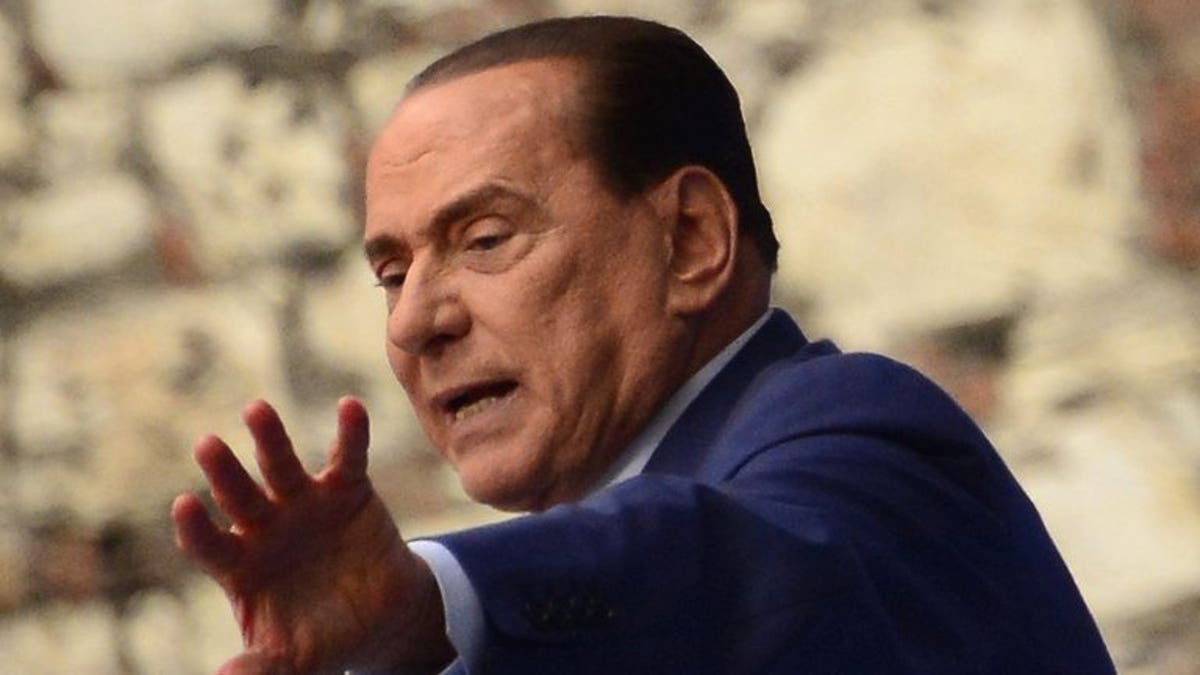
Former Italian premier Silvio Berlusconi delivers a speech during a rally in Brescia, on May 11, 2013. Italy is braced for a landmark ruling in a tax fraud case against Berlusconi that could eject the billionaire tycoon from parliament and upset the recession-hit country's fragile coalition government. (AFP/File)
ROME (AFP) – Italy braced Wednesday for a landmark ruling in a tax fraud case against former prime minister Silvio Berlusconi that could eject the billionaire tycoon from parliament and upset the recession-hit country's fragile coalition government.
Lawyers made their final arguments at Italy's highest court in Rome in the case involving the scandal-tainted 76-year-old playboy.
The three-time former premier, at his last appeal, was given a sentence of a year in prison and a five-year ban from parliament, which has been suspended pending this final appeal.
"The sentence is lacking any evidence that Berlusconi could have participated in the crime," his lawyer, Niccolo Ghedini, told the court.
Italian media quoted court sources saying the ruling would likely come on Thursday.
If he loses his case, it would be the first ever definitive conviction for Berlusconi, who has been dogged by legal woes for over two decades.
A victory would be a boost for the ageing playboy, who has always either been acquitted or seen charges dropped after his lawyers succeeded in drawing out legal proceedings beyond the statute of limitations.
Shares in Berlusconi's Mediaset business empire meanwhile fell 1.61 percent on the Milan stock exchange and the Il Sole 24 Ore business daily said the situation was "potentially explosive" for Italy.
At the start of the hearings on Tuesday, prosecutor Antonio Mura accused Berlusconi of being the "mind behind the tax fraud mechanism" at Mediaset.
Mura asked for the prison term to be confirmed but said the ban from public office should be limited to three years instead of five.
If the verdict is upheld, the Senate would still have to vote for the sentence to be implemented -- a procedure that could take several months.
In other cases, Berlusconi is appealing against convictions for having sex with an underage prostitute, abusing his powers as prime minister and leaking a police wiretap to damage a political rival.
Even if he loses his appeal, he is highly unlikely to face actual prison time because of lenient sentencing guidelines for elderly people in Italy.
He could, however, be put under house arrest at his villa near Milan or be ordered to perform community service.
The ban from parliament would also not necessarily cast him out from the political arena and he could stay on as a figurehead leader of the centre-right.
Berlusconi could also be acquitted or the judges could decide to send the case back to the appeal courts, a decision which would probably mean the charges expiring before any new appeal trial ends.
Whatever the outcome, Italians are concerned about the effect it could have on a fragile right-left coalition government formed following a two-month deadlock after a general election in February.
Berlusconi has repeatedly said the ruling should have no impact on the government, a sentiment echoed by centre-left Prime Minister Enrico Letta.
But diehard Berlusconi fans are threatening a mass walkout from parliament if he is convicted -- a move that could trigger fresh elections in a recession-hit country that is the eurozone's third largest economy.
